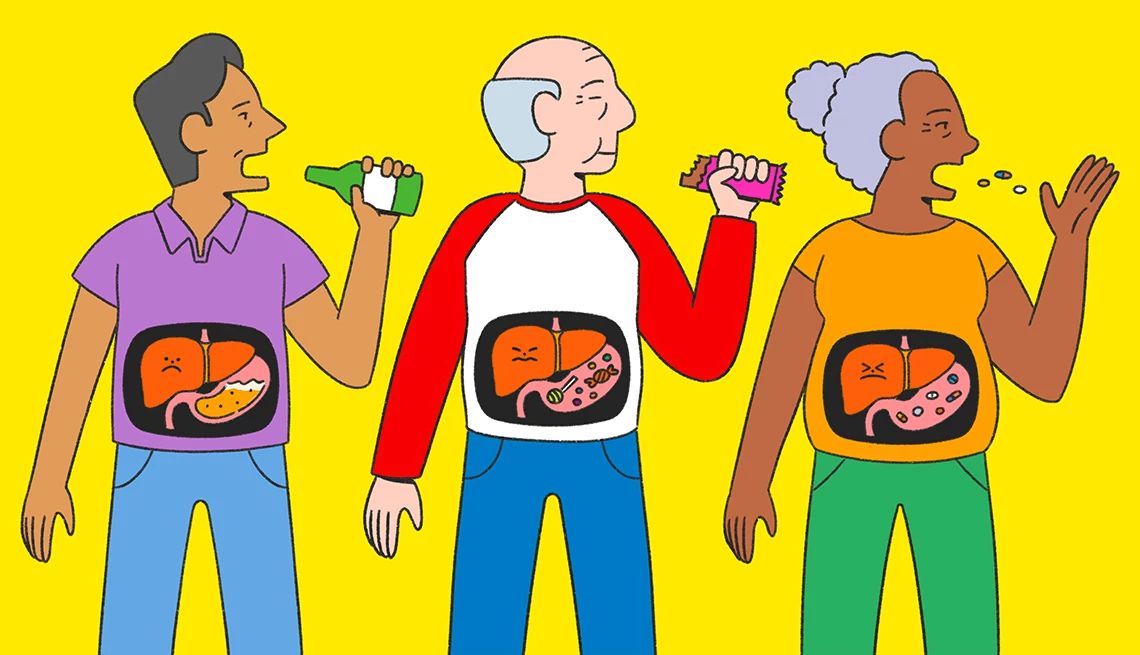AARP Hearing Center


If there’s one thing the liver is not, it’s lazy. This hardworking organ is involved in several essential jobs — from breaking down food and storing nutrients to filtering toxins from the blood and fighting infections — which is why keeping your liver in top shape is key to staying healthy as you age.
Still, many of us engage in everyday activities that can damage the liver over time. Here are nine habits that health experts say you should change for the sake of your liver.
1. Skipping your workout
The liver doesn’t want you to be sedentary. In fact, it loves exercise, says Elliot Tapper, M.D., an associate professor in the division of gastroenterology and hepatology at the University of Michigan Medical School — “and, in particular, resistance exercise,” he adds.
“Even people who don't lose weight, when they start doing resistance exercise, the training of the muscles changes the way that hormones circulate,” he says, and this helps “drain fat” out of the liver.
A small study published in the journal Gut found that sedentary adults diagnosed with nonalcoholic fatty liver disease (which occurs when too much fat builds up in the organ) who did eight weeks of resistance exercise saw a 13 percent reduction in liver fat, independent of weight loss. They also saw improved markers of blood sugar regulation, which is another sign of improved liver health.
That’s not to say you shouldn’t also be doing cardio. “Something that gets your heart pumping” benefits the liver, says James Hamilton, M.D., director of hepatology at Johns Hopkins Medicine.
“What we recommend generally is 30 minutes, five times a week, where you're doing something where your heart is increasing in its output,” he says. “Even that, without weight loss, has been shown to reduce fatty liver and improve insulin resistance.”
In fact, an analysis of research published in The American Journal of Gastroenterology found that adults who participated in the recommended 150 minutes each week of moderate to intense aerobic activity, like a brisk walk, saw a greater improvement in liver fat than those who didn’t hit that mark.
2. Taking certain supplements
If you scroll social media long enough, you’ll no doubt encounter ads for supplements promising to heal your liver. Not so fast with the “buy now” button, doctors say.
“Your liver is like an automatic self-cleaning oven. It detoxifies by itself,” says Lisa Ganjhu, a gastroenterologist and hepatologist at NYU Langone Health. Take detoxifying supplements and you actually run the risk of injuring the organ.
“The supplements that give me a heart attack, that keep me up at night, are turmeric and green tea — and these are increasingly common,” Tapper says, emphasizing that the worry with these products is when they’re in supplement form and not as foods.
In fact, research published in 2024 in the journal JAMA Network Open found that turmeric and green tea supplements were the most commonly consumed of six supplements associated with liver toxicity.
Because supplements are not regulated by the Food and Drug Administration the same way other over-the-counter medications are, consumers don’t always know the ingredients in the bottle and the potency of these pills and powders, Hamilton explains. “And taking too much of it can potentially be toxic,” Ganjhu adds.




































































More From AARP
Essential Tips for Boosting Liver Health
Reverse damage and avoid serious problems in the future
How to Break Bad Health Habits
Usher out your old ways and welcome in healthier routines
10 Worst Habits for Your Heart
Everyday actions that can negatively affect your health